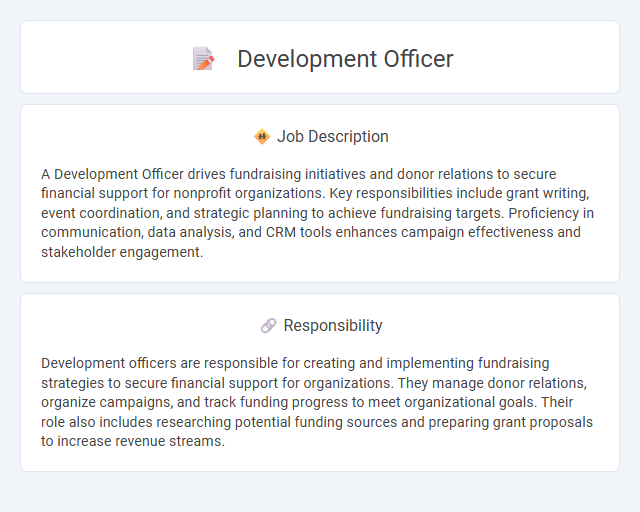
A Development Officer drives fundraising initiatives and donor relations to secure financial support for nonprofit organizations. Key responsibilities include grant writing, event coordination, and strategic planning to achieve fundraising targets. Proficiency in communication, data analysis, and CRM tools enhances campaign effectiveness and stakeholder engagement.
People with strong communication skills and a passion for community improvement are likely to be well-suited for a Development Officer role. Those who thrive in environments requiring project coordination, stakeholder engagement, and strategic planning may find success in this job. Individuals who prefer routine tasks or limited social interaction might face challenges adapting to the dynamic and people-focused nature of the position.
Qualification
A Development Officer typically holds a bachelor's degree in fields such as business administration, marketing, communications, or nonprofit management, often complemented by experience in fundraising or project coordination. Proficiency in data analysis, relationship management, and communication tools like CRM software enhances effectiveness in securing grants and building donor networks. Strong skills in strategic planning, event organization, and grant writing are essential to drive successful development initiatives and achieve organizational growth.
Responsibility
Development officers are responsible for creating and implementing fundraising strategies to secure financial support for organizations. They manage donor relations, organize campaigns, and track funding progress to meet organizational goals. Their role also includes researching potential funding sources and preparing grant proposals to increase revenue streams.
Benefit
A Development Officer role likely offers significant benefits including opportunities for professional growth and networking within various industries. The position may provide competitive compensation packages, which often include health benefits and performance-based bonuses. Job stability and the chance to contribute meaningfully to organizational success are also probable advantages of this career path.
Challenge
The role of a development officer likely involves navigating complex fundraising landscapes and managing diverse stakeholder expectations, which presents significant challenges. Success depends on the ability to strategize effectively under pressure and adapt to changing donor priorities. Persistent obstacles may include securing consistent funding streams while demonstrating measurable impact to justify investment.
Career Advancement
Development officers drive fundraising initiatives and cultivate donor relationships to secure financial support for organizations. Mastery in strategic communication, project management, and networking significantly enhances prospects for promotion to senior development roles or director positions. Continuous skill development in grant writing and data analysis accelerates career growth and access to leadership opportunities in nonprofit or corporate sectors.
 kuljobs.com
kuljobs.com